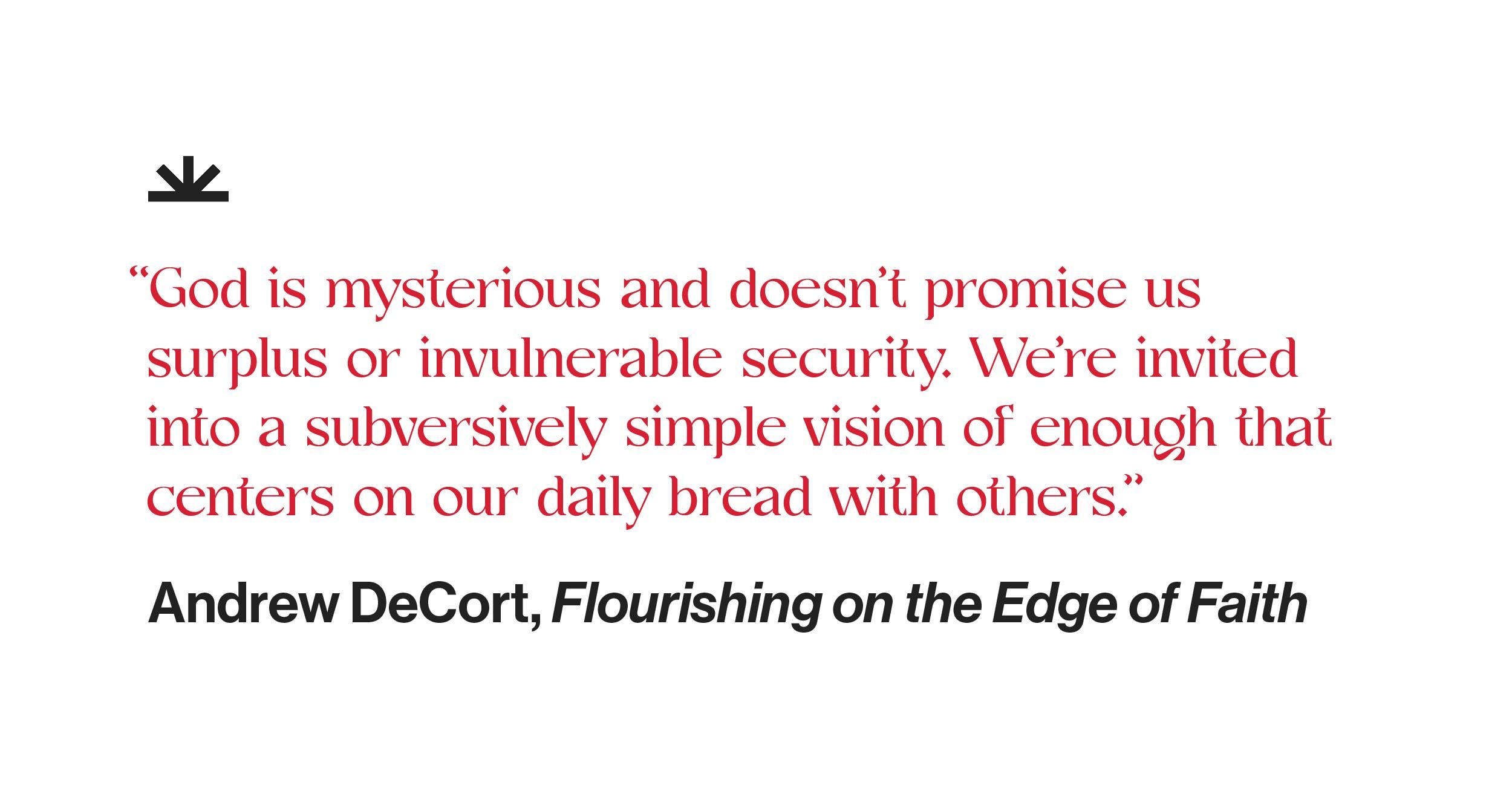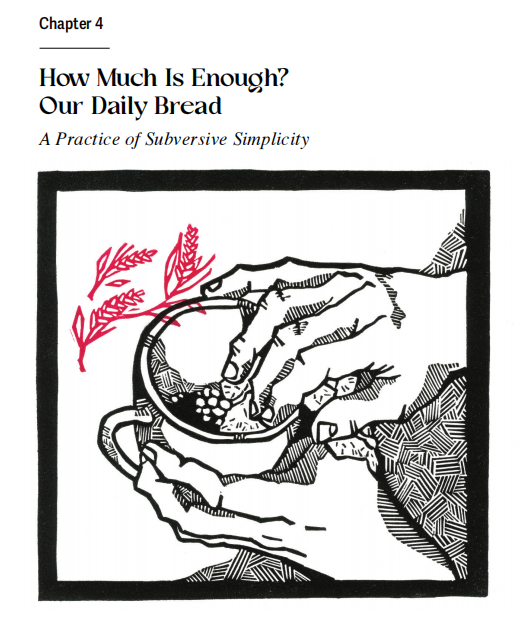Dear friends,
How much is enough? What do you need to feel secure and content?
In the fourth practice of his prayer, Jesus teaches us to ask God, “Give us today our daily bread.” This is a spiritual practice of subversive simplicity. It fully affirms that God cares about our physical needs (“our bread“). But it also challenges our consumeristic desire for surplus and reminds us that our needs are shared with others (“our bread”). It’s a counter-cultural vision of enough, of what we need to flourish as God’s beloved children.
 I find Jesus’s fourth practice one of the most unsettling and liberating of the seven in his prayer. I hope you enjoy reading the excerpt below from Flourishing on the Edge of Faith and join me in practicing with Jesus daily.
I find Jesus’s fourth practice one of the most unsettling and liberating of the seven in his prayer. I hope you enjoy reading the excerpt below from Flourishing on the Edge of Faith and join me in practicing with Jesus daily.
A brief testimony first…
When I started writing Flourishing on the Edge of Faith, I didn’t have a publisher lined up. I knew that I was called to write this book, and I devoted myself to working on it daily. But I wasn’t sure who would help me share it with the world. And so sitting down to write each morning felt like a prayer for “daily bread” in the face of this uncertainty. (Deep thanks to my board for encouraging me to walk by faith!)
Then on February 11, 2022, my dear friend Kate Schmidgall invited me to come to D.C. and meet with her team at BitterSweet. I was overwhelmed with joy when Kate sat me down with books spread on her table and asked to be my publisher. The alignment of our values was truly seamless, and we shared a vision for this book to be published in paperback, audiobook, and ebook formats. I said yes without hesitation.
Exactly one year later to the day (!), Kate and I sat at the same table and held Flourishing on the Edge of Faith in our hands. The night before, we shared the joy of launching the book – in paperback, audiobook, and ebook – with BitterSweet’s community in Washington, D.C. Looking back on the previous year, it felt like the impossible had become possible and that God answered all of those prayers for daily bread. Deep thanks to Kate and the BitterSweet team for embodying God’s answer.

Perhaps today there’s a place of uncertainty or even impossibility in your life. As you read the excerpt below, I hope you’re encouraged to trust that God cares about your needs and will provide for you, even as God unsettlingly rescales our vision of what is truly enough.
May you flourish,
Andrew

Washing a cup after a meal is an invitation to give thanks and trust God. Artwork by Holly Harris
“Bread: The Courageous Mother Who Taught Me to Trust God for Our Needs”
In his previous movement of prayer, Jesus responded to one of humanity’s burning questions: What do you want? As we’ve seen, Jesus taught us to pray for God’s kingdom – God’s dream – to come on earth as it is in heaven.
After such an exalted petition, pivoting to pray for our daily bread may seem unimportant or even offensive to “God.” Shouldn’t we be ashamed to talk to our hallowed G-d about our hungry needs, our embodied appetites, and anxieties?
But Jesus takes us back to where his spirituality begins. God is our Father. And our Father opens the kingdom to us when we have nothing, calls us beloved, and cares about our basic needs. These things aren’t small or insignificant to the God who numbers our hair.
So suppressing our rumbling stomachs and anxious hearts isn’t actually spiritual. It’s a denial – whether fearful or prideful – of who God is as our Parent and who we are as God’s beloved children. Daily bread locks into Jesus’s prayer for the kingdom to come on earth as it is in heaven.
We see God’s concern for our physical needs in Jesus’s personal practice.
Not long after launching his movement, Jesus sends his students off on their first independent mission of “proclaiming the kingdom of God and healing the sick.” When they return, they ecstatically report to Jesus their amazing accomplishments. Interestingly, Jesus doesn’t tell them to accelerate, scale up, and do more. Instead, Jesus recognizes that they need rest, and together they “withdraw” to a remote village (Luke 9:2, 10).
But the crowds crash their retreat, and Jesus doesn’t turn them away. Instead, Jesus responds by “welcoming them, speaking to them about the kingdom of God, and healing those who needed healing.” Here we see the signs of chapter 3: love, relationship, and healing. Jesus spends time with these retreat-crashers until “late in the afternoon” (Luke 9:11).
The response of Jesus’s closest students is striking. They feel like they’ve finished the important work of preaching the kingdom and healing the suffering. So they tell Jesus to send the people away to look for food and shelter on their own.
But Jesus’s love is like his Father’s. Jesus’s biographer tells us that “he had compassion” for these people, and he refuses to send them away hungry. Instead, he challenges his kingdom-proclaiming, miracle-performing practitioners, “You give them something to eat” (Matthew 14:14; Luke 9:13). Recall Jesus’s warning that many people say, “Lord! Lord!” but resist doing the will of our Father in heaven.
So the disciples protest that they don’t have enough and that “spending that much on bread” would be an enormous waste of money. Ironically, the disciples had just depended on the generous hospitality of others as they traveled around Palestine proclaiming the kingdom and healing the sick. But like so many of us, they took this hospitality for granted and didn’t see it as itself a vital embodiment of God’s kingdom. For them, the important work was done, and they didn’t care if people were hungry.
What follows is one of Jesus’s most beautiful miracles.
He tells his students to bring the small amount of food that they actually have. Jesus holds it in his hands, looks up to heaven, and thanks God for it. Here again we see the reintegration of heaven and earth: Jesus holds bread, raises his grateful consciousness to the source of his belovedness, and prays with trust in a moment of scarcity. Then Jesus tells his students to start distributing the food to the crowd.
I can almost imagine holding a few scraps of bread in my hands and walking into a crowd of thousands of hungry people. A feeling of powerlessness and embarrassment flares up within me. But this is what they do, and in the end, “they all ate and were satisfied.” Ironically enough, there were twelve basketfuls of leftovers – one for each of Jesus’s anxious followers (Luke 9:16-17).
This miracle remains deliciously mysterious. Did Jesus himself turn five loaves and two fish into a meal that fed around ten thousand hungry people? Or did Jesus’s compassionate risk of sharing his food inspire people in the crowd to share what they had brought for themselves – and together they already had enough for everyone?
In either case, what matters to us is that food mattered to Jesus. In fact, soon after, Jesus did the exact same thing for a slightly smaller crowd, making sure that everyone had enough to eat (Matthew 15:32).
There’s challenging hope here for all of us.
Like many of us today, Jesus’s students still hadn’t internalized that the kingdom belongs to our Father and that our Father cares for our basic embodied needs. They dismissed daily bread as unspiritual and didn’t mind if people went hungry.
But for Jesus, sharing food is just as important as proclaiming the kingdom and healing the sick. In fact, it’s an embodiment of the kingdom’s presence, and he insists on people being fed.
So Jesus teaches us to bluntly and boldly ask God, Give us today our daily bread. This isn’t unspiritual. It’s the most basic way of confessing that we actually trust that God is who Jesus says God is: our Parent who listens to our prayers and cares for our needs.
When I was a pastor in Ethiopia, I committed to walking to work for six months. This daily walk took me through the heart of Addis’s shiny economic development. And yet on Africa Avenue, amidst the new shopping malls and stuffed grocery stores, there were numerous street children begging for bread. My heart was broken seeing small kids the same age as my beloved nieces and nephews out on the streets, late into the night, hungry for food.
So I decided to save my bus money, walk on foot, and buy meals for the kids on my way home from work at night. This wasn’t about virtue signaling or being a White savior in Africa. I wanted to meet these children right where they were and cultivate the face-to-face relationship that Jesus says brings heaven to earth. It wasn’t much, but it’s what I could do rooted in my everyday practice.
The beautiful smiles that erupted on these children’s faces continue to glow in my memory through the years. They were intimately familiar with hunger and humiliation, with want and being unwanted. For a stranger to approach them with love and food was a source of joy and thanksgiving. Our simple meals were like tiny foretastes of the kingdom’s global party breaking out right there on Africa Avenue.
These impoverished children became my professors of radical trust in God. They helped me digest in the core of my being that our bodily health and sharing bread are just as important to God as anything we can ever do in a church building.
Wudenesh was one of the little girls that I met on the street during those walks. She had deep, kind eyes and walked with a clanky cane due to her bone tuberculosis. After sharing several meals, Wudenesh led me to her home deep in a nearby slum and introduced me to her strong mother Itash and the rest of her family.
For over a decade now, I’ve often sat in Itash’s mud-walled, one-room home and listened to her talk about trusting God as we eat her delicious injera – Ethiopia’s daily bread. And Itash and Wudenesh were present as our guests of honor when Lily and I got engaged. We’ve celebrated many joyful holidays and birthdays together ever since.
Through the years, I’ve always taken my ethics students for a meal at Itash’s humble home. This is our most important classroom, and this courageous woman serves as one of our prophetic professors. She always tells us, “If I have just one cup of coffee per day, I give thanks to God.” In the midst of her joys and struggles, Itash resiliently embodies trust in God and gratitude for daily bread.
Her example has profoundly challenged me to reimagine the meaning of enough.
*** Excerpted from Andrew DeCort, Flourishing on the Edge of Faith: Seven Practices for a New We (Washington, DC: BitterSweetBooks, 2022), 68-72. Available at BitterSweetBooks, Audible, Kindle, Barnes & Noble, and all major booksellers.



